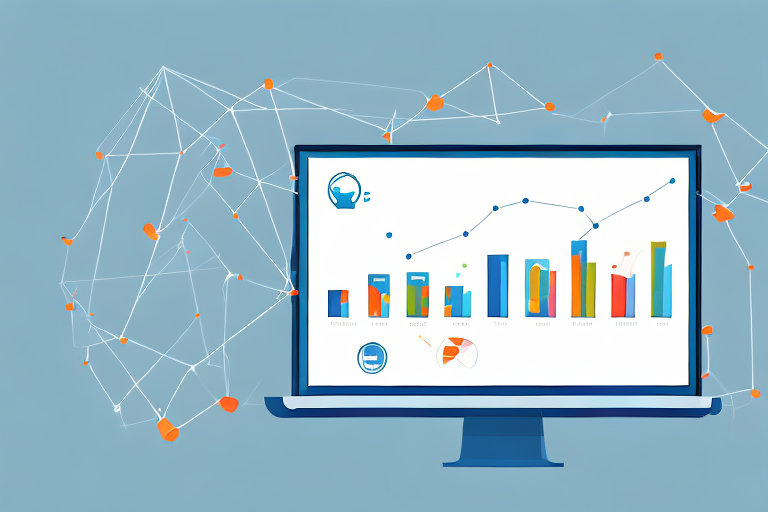.svg)
Leveraging Data and Insights for Data-Driven Content Marketing
.svg)

In today's digital landscape, data has become a powerful tool for marketers. The ability to collect, analyze, and leverage data insights can significantly enhance content marketing strategies and drive better results. By leveraging data and insights, businesses can develop a data-driven content marketing approach that resonates with their target audience and delivers tangible results.
Understanding the Importance of Data in Content Marketing
Data forms the foundation of effective content marketing strategies. It provides valuable insights into consumer behavior, preferences, and trends. Understanding the importance of data in content marketing is crucial for businesses looking to create impactful and relevant content that engages their target audience.
In today's digital age, where information is abundant and attention spans are shorter than ever, businesses must go beyond mere guesswork and assumptions when it comes to content marketing. They need concrete data to guide their strategies and ensure that their efforts are not wasted. Data-driven decision making has become the norm, and for good reason.
Let's delve deeper into the role of data in content strategy development and explore how it can drive content creation, distribution, and optimization.
The Role of Data in Content Strategy Development
When developing a content marketing strategy, data plays a vital role in identifying target audience segments, understanding their pain points, and aligning content efforts accordingly. By gathering and analyzing relevant data, businesses can develop a content strategy that addresses the needs and interests of their audience, leading to increased engagement and conversions.
Imagine a business that relies solely on guesswork to create content. They might spend hours crafting blog posts, videos, and social media updates, only to find that their efforts fall flat. Without data to guide them, they are essentially shooting in the dark, hoping to hit the target. On the other hand, a data-driven business can make informed decisions about the type of content to create, the platforms to use, and the messaging that resonates best with their audience.
By leveraging data, businesses can gain a competitive edge by understanding their target audience on a deeper level. They can identify the pain points that their products or services can solve and create content that addresses those pain points. This targeted approach not only increases the chances of attracting and engaging the right audience but also builds trust and credibility in the long run.
How Data Can Drive Content Creation and Distribution
Data-driven insights can fuel the creation and distribution of content that resonates with the target audience. By analyzing data on consumer preferences, browsing behavior, and demographic information, businesses can identify trending topics, popular formats, and effective distribution channels to optimize their content marketing efforts. This data-driven approach ensures that the content is relevant, timely, and impactful.
For example, let's say a business discovers through data analysis that their target audience is highly engaged with video content on social media. Armed with this knowledge, they can prioritize video production and distribution on platforms like YouTube and Instagram. By tailoring their content to the preferences of their audience, they can increase the chances of capturing attention, generating leads, and driving conversions.
Data can also help businesses identify gaps in the market and create content that fills those gaps. By analyzing search trends and consumer behavior, businesses can uncover untapped topics or areas where existing content falls short. This allows them to position themselves as thought leaders and provide valuable information that their audience is actively seeking.
Using Data to Identify Target Audience and Tailor Content
Understanding the target audience is key to creating content that captivates and converts. Data can provide valuable insights into the demographics, preferences, and behaviors of the target audience. By analyzing this data, businesses can identify their ideal customer profile, tailor content to their specific needs, and increase the chances of engaging and converting prospects.
For instance, data analysis might reveal that a significant portion of the target audience consists of millennials who are passionate about sustainability. Armed with this information, a business can create content that highlights their eco-friendly practices, showcases sustainable products, and educates their audience on the importance of environmental conservation. By aligning their content with the values and interests of their target audience, businesses can establish a strong connection and foster loyalty.
Data can also help businesses personalize their content to cater to individual preferences. By tracking user behavior, such as past purchases or content consumption patterns, businesses can deliver targeted recommendations and personalized experiences. This level of personalization not only enhances the user experience but also increases the chances of conversion by presenting users with relevant content that resonates with their specific needs and interests.
Leveraging Data to Optimize Content Performance and Engagement
Data can be a powerful tool in optimizing content performance and increasing audience engagement. By analyzing metrics such as page views, click-through rates, and social media shares, businesses can identify high-performing content and understand what resonates best with their audience. This data-driven optimization ensures that future content efforts are focused on what works, leading to improved engagement and conversions.
Imagine a business that publishes blog posts regularly but fails to track their performance. Without data, they have no way of knowing which posts are generating the most traffic, attracting the most engagement, or driving the most conversions. However, with data analytics, they can identify the top-performing posts and replicate their success by understanding the factors that make them stand out.
Data can also help businesses identify areas for improvement and make data-backed decisions to enhance content performance. For example, if a business notices that their email open rates are declining, they can analyze the data to identify potential reasons and experiment with different subject lines, content formats, or sending times to improve engagement.
By constantly monitoring and analyzing data, businesses can stay agile and adapt their content marketing strategies based on real-time insights. This iterative approach allows them to continuously optimize their efforts, maximize their return on investment, and stay ahead of the competition.
Collecting and Analyzing Data for Content Marketing Success
Collecting and analyzing data is essential for data-driven content marketing success. Businesses must invest in the right data collection methods, track key metrics, and utilize tools and technologies that facilitate effective data analysis.
Choosing the Right Data Collection Methods for Your Content Strategy
There are various methods to collect data for content marketing purposes. These include website analytics, customer surveys, social media listening, and email marketing analytics. Each method offers unique insights that can help businesses understand audience preferences, behaviors, and pain points. Choosing the right data collection methods for your content strategy ensures that you gather relevant and actionable insights to inform your marketing efforts.
Key Metrics to Track and Analyze for Data-Driven Content Marketing
Tracking and analyzing key metrics is essential for measuring the success of your content marketing campaigns. Metrics such as website traffic, conversion rates, time on page, and social media engagement can provide valuable insights into the effectiveness of your content strategy. By tracking these metrics, businesses can identify areas for improvement and optimize their content to drive better results.
Tools and Technologies for Data Analysis in Content Marketing
The right tools and technologies can make data analysis in content marketing more efficient and accurate. From comprehensive analytics platforms to social listening tools, there are a plethora of options available to businesses. These tools enable businesses to collect, analyze, and visualize data, allowing for better decision-making and more impactful content marketing strategies.
Applying Data Insights to Enhance Content Strategy
Data insights are only as effective as the actions taken based on them. Businesses should apply data-driven insights to enhance their content strategies and maximize results.
Utilizing Data to Identify Content Gaps and Opportunities
Data analysis can help identify content gaps and opportunities within a specific niche or industry. By understanding what topics are already well-covered and where there may be opportunities for unique and valuable content, businesses can tailor their content strategy to stand out from the competition and provide additional value to their audience.
Personalizing Content Based on Data-Driven Insights
Personalization is key in today's marketing landscape. By leveraging data insights, businesses can create personalized content experiences for their audience. By understanding the preferences, browsing behavior, and demographics of their audience, businesses can deliver tailor-made content that resonates with individuals on a personal level, increasing engagement and conversions.
A/B Testing and Data-Driven Iteration for Content Optimization
A/B testing is a valuable technique for optimizing content performance. By testing different variations of content, headlines, or calls to action, businesses can gather data on what resonates best with their audience. This iterative approach allows for continuous improvement and refinement of content marketing strategies based on actionable data insights.
Measuring the Impact of Data-Driven Content Marketing
Measuring the impact of data-driven content marketing is crucial for assessing the success of marketing efforts, identifying areas for improvement, and driving better results.
Defining Key Performance Indicators (KPIs) for Data-Driven Content Marketing
Defining key performance indicators (KPIs) is essential for measuring the success of data-driven content marketing efforts. KPIs can include metrics such as lead generation, conversion rates, brand awareness, or customer engagement. By setting clear KPIs and tracking them over time, businesses can evaluate the effectiveness of their content marketing strategies and make informed decisions for future campaigns.
Tracking and Reporting on Content Performance Metrics
Regularly tracking and reporting on content performance metrics provides businesses with valuable insights into the impact of their content marketing efforts. By analyzing metrics such as website traffic, engagement rates, and conversion rates, businesses can identify trends, patterns, and areas for improvement. This data-driven approach ensures that content strategies are aligned with business goals and audience preferences.
Using Data to Continuously Improve and Refine Content Strategy
Data should not be seen as a one-time analysis but as an ongoing process of continuous improvement. By regularly analyzing data and feedback, businesses can adapt their content marketing strategies to changing audience needs and preferences. This iterative approach allows for better decision-making, refined content strategies, and increased ROI.
In conclusion, leveraging data and insights is essential for effective data-driven content marketing. By understanding the importance of data, collecting and analyzing relevant insights, and applying those insights to enhance content strategies, businesses can create impactful and personalized content that drives engagement and conversions. Measuring the impact of data-driven content marketing through key performance indicators allows for continuous improvement and refinement of strategies, ensuring long-term success in the ever-evolving digital landscape.
Related Posts
Let's
Let’s discuss how we can bring reinvigorated value and purpose to your brand.







.svg)